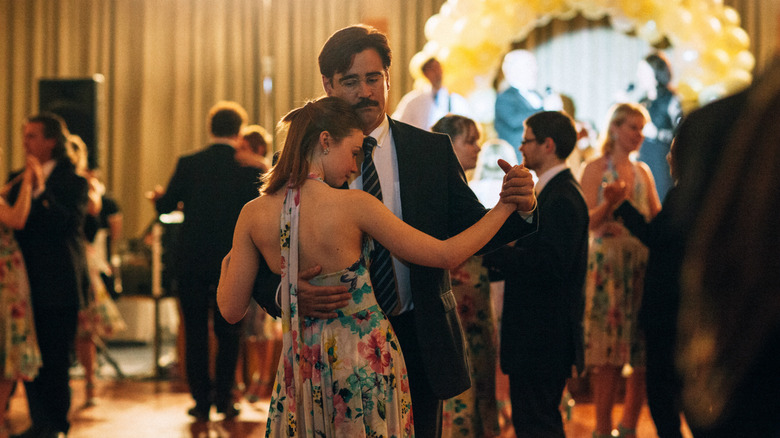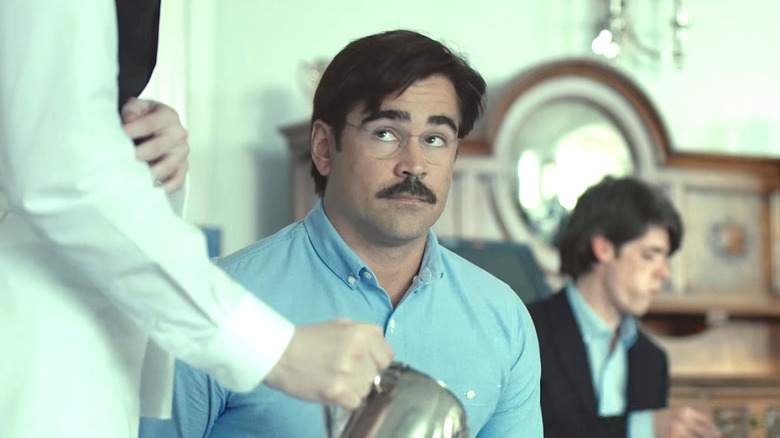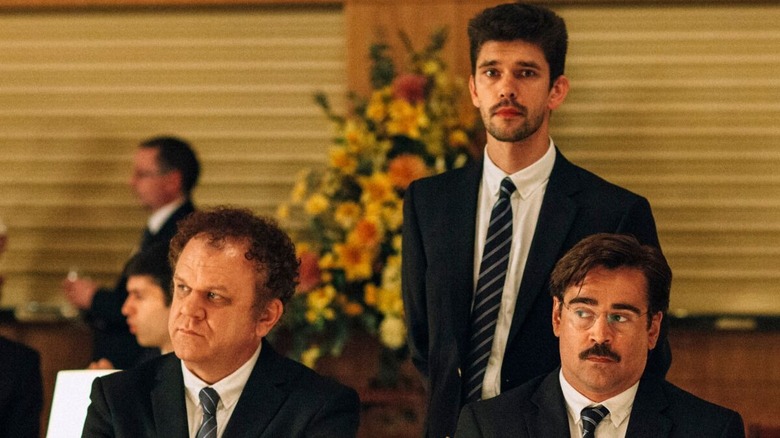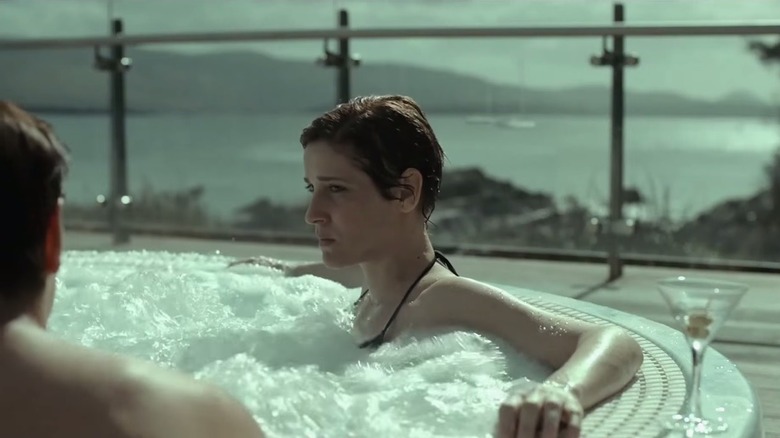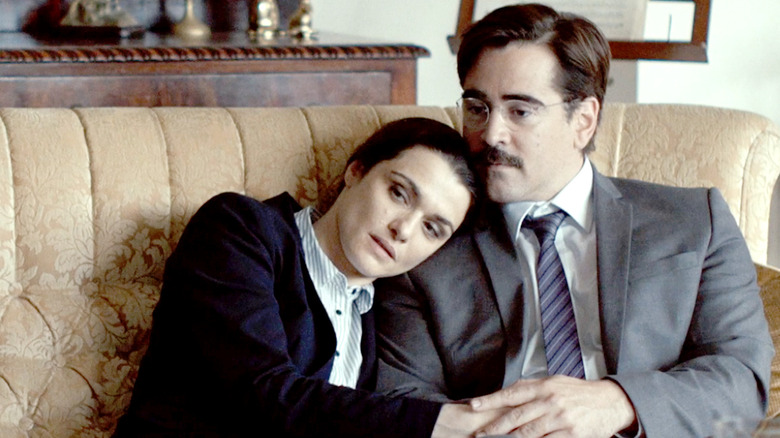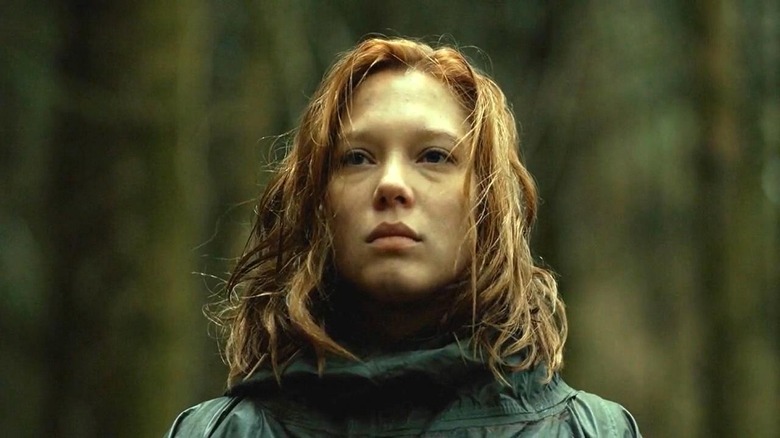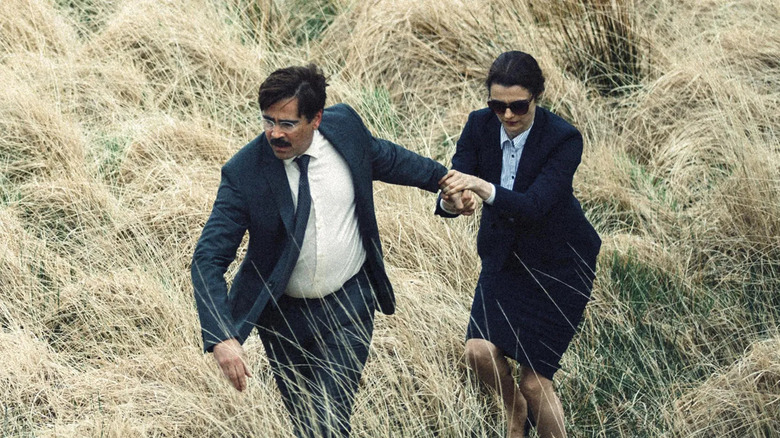The Lobster Ending Explained: Finding The Perfect Match
Like all the films of Yorgos Lanthimos, "The Lobster" left me completely cold when I first saw it — he's clearly one of the most original directors around, but my more optimistic outlook clashed with his bleak view of humanity. The film made far more cruel sense when I became single again after 21 years. Tucked away in a long-term relationship, I suppose I was cozily insulated from the horrors of dating and the pressure society places on people to be with someone. Nobody wants to be the crazy cat person, right?
The Twin Towers were still standing the last time I was actively seeking a partner, so I'm a long way away from wanting to date again. Still, those pressures that regularly cast single people as loners or weirdos have compelled me to check out Tinder to see what all the fuss is about. It really is as horrible as I'd heard — judging people by their appearance and only taking a glance at their profile does little to offset the gross shallowness of it all. Oh, so I'm a great match with Daisy because she likes movies? If she turns out to be a Marvel devotee against my love of cult oddities and folk horror, it could be a match made in hell.
"The Lobster" came out three years after Tinder was launched and, in Lanthimos's typically caustic and deadpan way, takes to task both the societal constructs that make us feel like we need to be in a relationship to be normal and the blunt superficiality of dating. I still don't like the movie, but I can appreciate what it is saying more now. Time to unpack that ambiguous ending.
So what happens in The Lobster again?
After a startling opening scene where a woman guns down a donkey in a field, "The Lobster" introduces us to David (Colin Farrell), whose wife has ditched him for another man. Before he even has a chance to absorb the bad news, he is taken away to a stately old hotel where he and the other singleton guests have 45 days to fall in love. If they don't, they will be turned into an animal of their choice. They will then be released into the wild, or become someone's pet like David's brother, who is now his faithful dog. When the Hotel Manager (Olivia Colman) asks David to choose an animal, he picks a lobster.
Life at the hotel is strictly regimented. The singles are seated facing the couples in the dining room, to remind them of their goal. They must attend propaganda presentations about the virtues of being in a relationship. And they must mingle awkwardly at dances in the ballroom, dressed in the same drab formal clothing that's provided to all of them. While masturbation is banned and severely punished, the male guests receive mandatory sexual stimulation from the Maid (Ariane Labed) to get their juices flowing. Lastly, those running out of time to find a match can earn bonus days by going out on hunts to catch escaped Loners in a nearby forest.
While at the hotel, David befriends two guys: John (Ben Whishaw) who has a limp, and Robert (John C. Reilly) who has a lisp. These details are important in the world of "The Lobster" because singles are encouraged to define themselves by one characteristic and find a potential match in someone with similar attributes. For the short-sighted David, that means finding someone whose vision is similarly impaired. But can he do that before he gets turned into a crustacean?
Finding love in The Lobster
"The Lobster" pares the (Tinder) profile aspect of dating down to an absurdist extreme — people in its strange world are so fixated on trivial characteristics that they can't see anything else about a person. This is a society that has become so rigidly compartmentalized that there is no scope for vagaries. When David checks into the hotel, he is asked whether he is straight or gay. He muses that he once had a gay encounter but prefers women. Could he put himself down as bisexual then? Nope, he must pick between straight and gay.
This system forces people towards extreme behavior. Biscuit Woman (Ashley Jensen), a middle-aged lady with a fondness for buttery cookies, desperately offers David sexual favors as her allotted time ticks away. She says she would rather take her own life than get turned into an animal. John painfully fakes nosebleeds to make a match with Nosebleed Woman (Jessica Barden). Her Best Friend (Emma O'Shea), known for her lovely blonde hair, is either too proud or disillusioned with the whole thing to participate — she's happy to accept her fate as a pony with a blonde mane.
With his time and options dwindling, David takes inspiration from John's deception to fake a trait of his own. He hones in on Heartless Woman (Angeliki Papoulia) whose callousness makes her one of the hotel's most fearsome hunters of Loners.
David and the Heartless Woman
As David is the protagonist of "The Lobster," it feels a little off-putting when he decides to try and make a match with someone as vindictive as the Heartless Woman. Why does he choose her? It could be partly superficiality on David's part. After all, the two youngest and most conventionally-attractive women at the hotel — Nosebleed Woman and her Best Friend — are out of the picture now. And he's repelled by Biscuit Woman's despairing advances, even though she would probably be a better match for him than Heartless Woman.
But the bigger reason is likely that it's easier for him — after a painful breakup — to feign a lack of emotion, rather than true feelings towards another person. More so in a make-or-break situation at the hotel.
David pulls off the ruse at first — though it doesn't seem that hard to fake a lack of emotion in this society. Everyone talks in a monotone and rarely cracks the barest hint of a smile. He passes Heartless Woman's first two tests by showing no empathy at all for Biscuit Woman after she makes good on her threat to kill herself. Then, he forces himself to look on impassively as his prospective partner — the Heartless Woman — pretends to choke on an olive in the jacuzzi.
They are rewarded for making a match with a double room. If they stay together for two weeks, they can move onto a private yacht for the remainder of their trial period. But the problem for David is that the Heartless Woman still suspects him of faking cruelty. To test him, she sadistically kicks his brother (the dog) to death.
Loner life in the forest
Killing David's brother blows the lid off his pretense — the Heartless Woman attempts to report him, but he is assisted by the Maid in tranquilizing her and dragging her into the Transformation Room as a form of revenge. Now, he has no choice but to run away into the forest, where he encounters a band of militant Loners headed by a fierce Leader (Léa Seydoux). We later learn that the Maid helped David because she is part of the Resistance too.
David may have escaped the hotel and his impending future as a lobster, but he finds that life with the Loners isn't much better. Sure, he can enjoy the freedom of being single — including masturbating whenever he feels like it — but the Loner philosophy has become a form of zealotry, driven by the extremist Leader. Loners aren't allowed to show affection, and kissing or sexual intercourse is punishable by mutilation. In contrast to the hotel's awkward dances, the Loners are provided with electronic music to listen to on personal devices while they dance alone.
The Loner Leader runs the community like a guerrilla unit — each member digs their own grave because no one else is going to do it for them. It's a miserable existence, but despite the harsh restrictions, David finds himself attracted to a woman (Rachel Weisz) who is also short-sighted. Still conforming to society's insistence on finding arbitrary things in common, it is her eyesight rather than anything else that seals the deal for him. They fall in love and embark on a sexual relationship in secret at great risk. The only chance they get to behave like a "normal" couple is during trips with the Leader to the City, where showing affection is vital to maintaining their cover.
The Leader's malice
A more compromising writer-director than Yorgos Lanthimos might have been content to make the rebels the heroes of "The Lobster," but they are portrayed as fanatics who are opposed to the hotel and the society it serves. The Leader is driven by a genuine hatred of couples that goes beyond a fundamental aversion to the system. She doesn't just want to take it down — she wants to blow up the societal construct of a happy monogamous relationship.
We see this when she leads a raid on the hotel, crashing into the Hotel Manager's room one night where she is asleep in bed with her husband. Although he first claims to love her with "all his heart," he flips quickly when presented with a choice — die or kill his wife instead. He readily attempts to shoot her, but the gun isn't loaded. The Hotel Manager survives, but the lesson is harsh. We don't get to see the fallout, but it's hard to imagine how a relationship could survive a revelation like that. Still, the Leader's intervention doesn't do anything to tear down society's commitment to the couples program. We later see that the hotel bus is still running, ferrying Loners to rehab.
There is real spite in the Leader's attitude towards couples. David and the Short Sighted Woman fall foul of it when the latter's diary is discovered on the eve of their escape attempt to the City. The Leader punishes them by having the woman blinded by a doctor. It's a callous act, and though David still spends time with her, his heart doesn't seem to be in it. Even so, David decides that they should still make a break for it.
The Lobster ending explained
David subdues the Leader and leaves her tied up in her grave as food for wild dogs, calling back to the scene when she forced him to dig his final resting place. He and the Short Sighted Woman travel into the City and sit down at a restaurant. David asks a waiter for a steak knife and heads to the bathroom to blind himself.
This highlights a masochistic element of the men in this dystopia. Rather than seek a connection beyond trivial physical traits, they'd prefer to injure themselves or do morally questionable things to find a partner. A more logical and far less painful solution for David would be to feign blindness — just as he faked heartlessness — than actually take his eyes out. David's literal short-sightedness reflects his inability to see any better options available to him.
"The Lobster" ends on an ambiguous note with the Short Sighted Woman waiting patiently at the table for David to return. There isn't any noise from the bathroom — is David still thinking about it, or has he snuck away and left her sitting there? Yorgos Lanthimos leaves the answer to the audience as the credits roll on the worst date movie ever. Or does he?
Earlier in the film, when David states his reasons for choosing a lobster, he mentions that he loves the sea. At the end of the credits, we hear wind and waves. Is this a hint that David was unable to make a sacrifice for the supposed love of his life — much like the Hotel Manager's husband — and has accepted his fate? After all, some lobsters can live for at least 100 years. That's plenty of time to find a mate — without the agony of poking your beady little eyes out.
